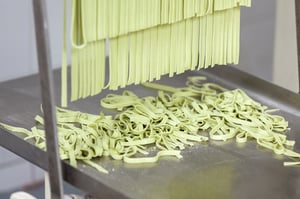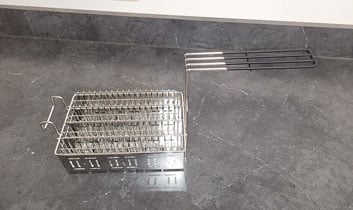
The FDA’s Food Rule states that “materials that are used in the construction of UTENSILS and FOOD-CONTACT SURFACES of EQUIPMENT may not allow the migration of deleterious substances or impart colors, odors, or tastes to FOOD.” Such materials also need to be:
- Safe;
- Durable, corrosion-resistant, and nonabsorbent;
- Sufficient in weight and thickness to withstand repeated washing;
- Finished to have a smooth, easy-to-clean surface; and
- Resistant to pitting, chipping, crazing, scratching, scoring, etc.
All of these requirements must be met for a metal to be considered “food safe.”
However, not just any food-safe metal will do when it comes to manufacturing food products. Manufacturers have to meet strict requirements for all of their food handling and processing equipment. Using the wrong kind of metal for a food manufacturing process could have disastrous results.
For example, if a given manufacturing process uses a lot of salt, using a “food-safe” metal that is weak to pitting corrosion from exposure to chlorides could result in the metal rusting. Then, that rust could contaminate the food being prepped.
Because of this, it’s important to be extremely careful when choosing a food-safe metal for your own food manufacturing application. To help you out, the Marlin Steel team has assembled a quick explanation of the top food-safe metals used in the food industry. It’s important to note that the FDA’s Food Rule doesn’t specify a list of approved metals. Instead, they specify limitations on what metals can be used and how they can be used.
Cast Iron (for Cooking Use Only)
The FDA’s Food Rule notes that cast-iron equipment is only approved for use in the food industry for cooking surfaces and in utensils for serving food “if the utensils are used only as part of an uninterrupted process from cooking through service.”
For all other uses, cast iron MAY NOT BE USED as a food-contact surface. Iron without a protective material is simply too vulnerable to corrosion and oxidation.
Aluminum
Aluminum is another commonly-used food-grade metal. Some key advantages of aluminum are its temperature tolerance, light weight, corrosion resistance, and low cost.
However, these advantages are offset by some weaknesses. Compared to many other metals, aluminum has a low tensile strength and impact tolerance, so it can’t take too much force without breaking.
Because it heats and cools quickly, aluminum is often used in cooking surfaces such as baking trays.
Copper
Copper has a limited range of uses in the food manufacturing industry because of its susceptibility to attack by acids. As noted in the FDA’s Food Rule, “copper and copper alloys such as brass may not be used in contact with a FOOD that has a pH below 6 such as vinegar, fruit JUICE, or wine or for a fitting or tubing installed between a backflow prevention device and a carbonator.”
Basically, anything more acidic than milk poses a corrosion risk to copper equipment, so it isn’t useful for large-scale manufacturing. There is a notable exception for the use of copper in beer brewing equipment “in the prefermentation and fermentation steps of a beer brewing operation such as a brewpub or microbrewery,” though.
Stainless Steel Alloys
Stainless steel comes in many different formulations, so it’s hard to generalize about the suitability of this material. So, here’s a quick overview of the stainless steel alloys most commonly used in the food industry:
Food Grade 304 Stainless Steel

Grade 304 stainless steel is the most commonly-used stainless steel alloy in use in a wide variety of industries. As a material, 304 stainless is highly useful because it can resist corrosion caused by a wide variety of chemicals and may be electropolished to a smooth, shiny, easy-to-clean surface.
However, some corrosives and excessive exposure to salt can still degrade 304 stainless steel.
Food Grade 316 Stainless Steel
Grade 316 stainless steel is an austenitic stainless steel alloy with a high chromium and nickel content. Like many steel alloys, it has a continuous use temperature several times higher than most food making processes will ever require (more than 800°C, or 1472°F).
What makes the grade 316 alloy an ideal food grade steel sheet material is the fact that it has a high resistance to acids, alkalis, and chlorides (such as salt). Other austenitic stainless steels, such as grade 304 SS, can experience severe pitting corrosion when exposed to salt, which is often present in food products.
316 makes for great food grade stainless steel containers for nearly any food application.
Food Grade 430 Stainless Steel
Stainless steel 430 food grade metal is very similar to grade 316 stainless. It has the same chromium content as 316, but only a fraction of the nickel content, which makes it a more affordable alternative for some food makers.
Another major difference between 430 and 316 stainless steel is that grade 430 SS is a ferritic alloy, meaning that it’s magnetic by default. Ferritic alloys like 430 SS also have extraordinary resistance to stress corrosion cracking (the growth of crack formations that can cause sudden failure in corrosive environments).
430 SS has a strong resistance to nitric and organic acids and is often used for applications where prolonged contact with mildly acidic compounds is a concern. The alloy also boasts a resistance to sulfur and oxidation.
However, because of the low nickel content, this alloy is not as resistant to some dilute reducing acids as grade 316 stainless steel would be.
Which is the Best for Your Application?
Choosing the best food-grade metal for your manufacturing application requires a thorough understanding of that application. Without knowing the specific chemicals, temperatures, and processes involved in your food manufacturing application, it’s nearly impossible to recommend a suitable food-safe metal for it.
If you need help picking the best food-grade metal for your own food-making process, reach out to the team at Marlin Steel. Marlin’s engineers have years of experience in crafting custom wire baskets to meet different food manufacturing challenges.







.gif)


